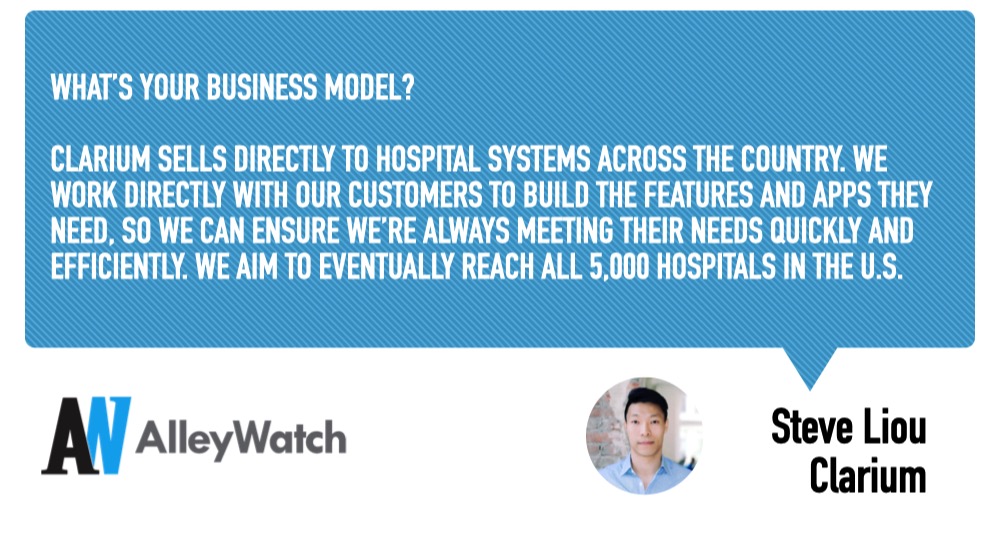In today’s healthcare landscape, hospitals overspend on their supply chains by over $25B annually due to fragmented data, inefficient workflows, and wasted supplies. As climate disasters, global pandemics, and economic tariffs intensify, supply chain vulnerabilities directly threaten patient care in hospitals across the country. Clarium has built Astra OS, an end-to-end platform that unifies data from hospitals and their suppliers in real-time while providing AI-powered workflow apps that help hospital teams improve productivity, visibility, and resiliency. Their technology enables leading health systems including Yale New Haven Health, Stanford, and Geisinger to monitor disruptions in real-time, automate substitute management, and optimize procedure card management. After implementing Astra OS, hospital systems have experienced over $10M in average cost savings, with 50% faster disruption resolution and 63% faster substitute approvals.
AlleyWatch sat down with Clarium CEO and Founder Steve Liou to learn more about the business, its future plans, and recent funding round that brings the company’s total funding raised to $43M.
Who were your investors and how much did you raise?
Northzone was our lead investor, and existing investors General Catalyst, AlleyCorp, Kaiser Permanente Ventures, Texas Medical Center Ventures, and 1984 Ventures also participated. We raised a $27M Series A round.
Tell us about the product or service that Clarium offers.
Clarium is the world’s first AI-powered resiliency platform helping major hospitals and health systems manage their supply chain operations. Clarium collects, unifies, and automates crowdsourced data from providers, suppliers, and vendors across the entire hospital supply chain, helping health systems manage workflow operations, inventory and stock, and disruptions and substitution needs. Clarium’s apps are ideated and built in collaboration with leading health systems, allowing Clarium to respond swiftly and directly to the needs of supply chain teams. After adopting Astra OS, hospital systems have seen over $10 million in average cost savings, fueled by 50% faster disruption resolution and 88% substitute approvals.
What inspired the start of Clarium?
 I spent over 15 years working as a healthcare investor, where I gained extensive exposure to data from hospital supply chains across the country. I saw just how fragmented, messy, and untapped the entire process was and how ripe for disruption the healthcare supply chain was.
I spent over 15 years working as a healthcare investor, where I gained extensive exposure to data from hospital supply chains across the country. I saw just how fragmented, messy, and untapped the entire process was and how ripe for disruption the healthcare supply chain was.
For years, the healthcare industry has overspent on its supply chain by over $25B annually. Hospitals have viewed their supply chains as cost centers, outsourcing the management when possible and stringing together point solutions to make do. There were almost infinite actionable insights within that data that could be used to lower costs, improve efficiency, and get smarter about supply chain management.
When the pandemic set in, it quickly made this issue more urgent, as hospitals struggled to manage increased patient demands, shortages of key supplies like masks and gloves, and high staff turnover. These issues haven’t slowed alongside the spread of Covid – in fact, many have only gotten worse amidst climate disasters, geopolitical events, and new economic policies.
I founded Clarium to support hospital systems with sophisticated, AI-powered supply chain technology that automates insights, predicts outages, and streamlines workflows, all to unlock efficiency for hospitals and their suppliers.
How is Clarium different?
Clarium is the only end-to-end platform for hospital supply chain management that carries through recommendations from analysis into workflow. We use AI to automate tasks that would typically be manual, or require coordination across multiple teams to achieve the outcome. While others have built point solutions to tackle one element of the process (i.e., inventory management solutions or analytics tools), no one is marrying all that data or using it to guide health systems toward greater efficiency and cost savings. Clarium is also the only solution that – in addition to data from vendors and suppliers – also ingests third-party market data, including weather and natural disaster information, economic data, and geopolitical factors. This helps us better prepare our partners for supply chain disruptions, like Hurricane Milton (which was a huge disruptor of IV fluid supply) or tariffs that could impact hospital economics and operations.
What market does Clarium target and how big is it?
Clarium targets the hospital supply chain market, providing an end-to-end solution for supply chain management in the U.S. The global market was estimated at $2.76B in 2023 and some estimates predict it will reach a value of $9.72B in 2032.
What’s your business model?
Clarium sells directly to hospital systems across the country. We work directly with our customers to build the features and apps they need, so we can ensure we’re always meeting their needs quickly and efficiently. We aim to eventually reach all 5,000 hospitals in the U.S.
 How are you preparing for a potential economic slowdown?
How are you preparing for a potential economic slowdown?
Economic slowdowns will be painful for health systems. For example, we saw supply chain leaders across the country scramble to calculate their tariff impact
What was the funding process like?
It was a pretty efficient process for us. We were not actively looking to raise funding as we had just raised $10.5M less than 12 months prior. However, a number of venture funds reached out with interest, and we were able to move quickly to find the best partner for us in Northzone.
What are the biggest challenges that you faced while raising capital?
Overall, the fundraising landscape was still quite difficult given market uncertainty – but we were really lucky to be able to find the right partner and the timing turned out to be perfect for us.
What factors about your business led your investors to write the check?
Our investors saw the incredible market need for a solution like ours, one that can serve as the foundation and backbone for hospital supply chains as they grow and evolve.
As Northzone partner and lead investor Molly Alter puts it, “Despite many recent advancements in healthcare technology, hospital procurement processes have largely remained stuck in the 20th century. While a number of point solutions exist, Clarium is the first comprehensive, end-to-end platform for managing the hospital supply chain. Clarium possesses the technology and vision to enable end-to-end supply chain management for every one of the 5,000 hospitals nationwide.”
What are the milestones you plan to achieve in the next six months?
Our focus for the coming months is to continue developing and scaling Astra OS, building new functionalities and applications as well as expanding into new areas. We also aim to expand our team, bringing on deeply knowledgeable and innovative tech and operational talent that can help us hone our products and scale them to new customers. Finally, we are focused on continuing to develop relationships with new health system partners and increase our overall reach.
What advice can you offer companies in New York that do not have a fresh injection of capital in the bank?
Our biggest advantage is a strong relationship with our customers. Companies that remain customer-centric and truly build to customer pain points and use cases will always have an opportunity to create and drive value.
What’s your favorite spring destination in and around the city?
I would have to say the open lawns in Central Park, Bryant Park, and Madison Square Park are some of my favorite locations during spring in New York, particularly for having picnics with friends and family.


